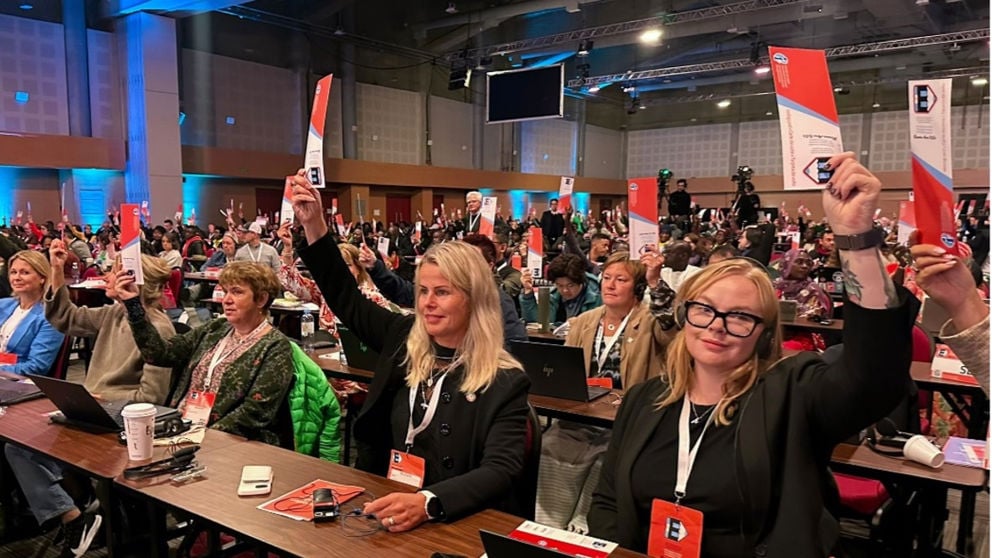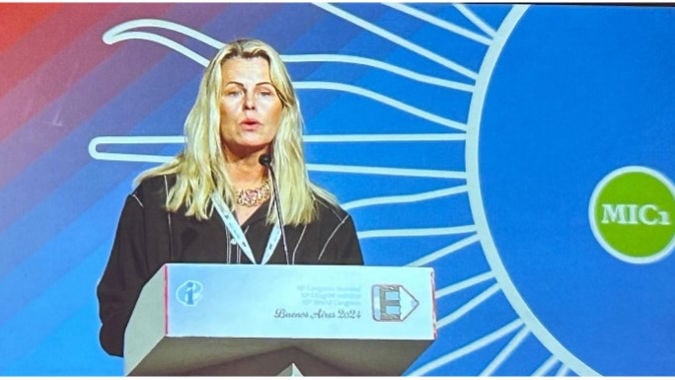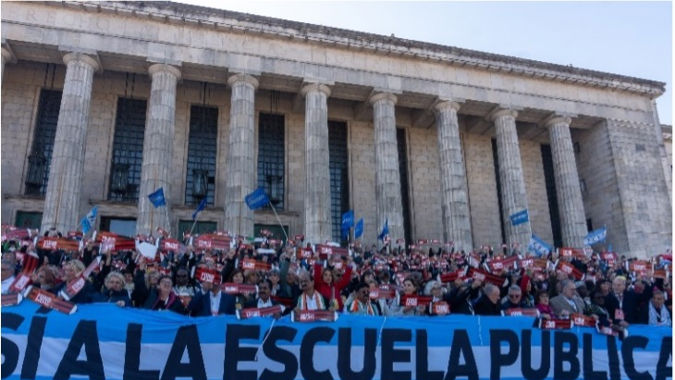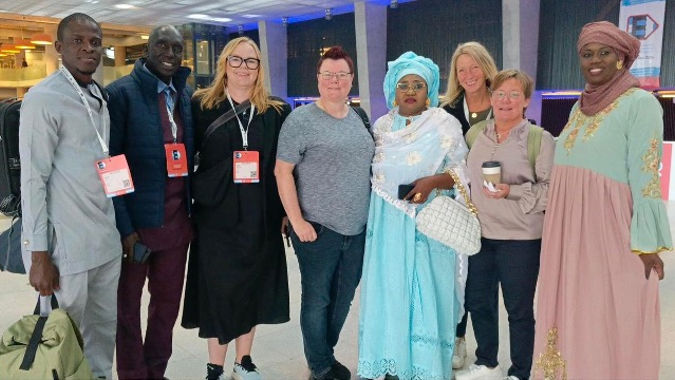The world counts on us and when we fight together we win!
Den 10:e Education International (EI) World Congress har genomförts i Argentina och parollen för den här kongressen var ”Growing our unions, elevating our professions, defending democracy.”

Sveriges Lärare hade en delegation på plats i Buenos Aires och jag kan konstatera att många av de frågorna som vi driver i Sverige är lika aktuella för våra kollegor runt om i världen men det finns också skillnader som ger viktiga perspektiv.
Världen står inför en lärarbrist utan motstycke, vilket hotar rätten till utbildning för miljontals barn och elever. Det förvärrar ojämlikhet och driver på diskriminering.
Vår delegation från Sveriges Lärare har i sann kongressanda förberett oss inför förslagen till kongressen, vi har hållit tal och anföranden och deltagit i temamöten. Det har skrivits motioner och resolutioner har hanterats. Vi har tagit ställning när det gäller personval till styrelseplatser och vi har tillsammans röstat om viktiga frågor som kommer att göra skillnad de kommande fem åren för EI´s medlemsorganisationer världen över.
Vi är alla överens om att det har varit ett stärkande och ärofyllt sammanhang att befinna sig i. Kraften blir väldigt påtaglig när 700 delegater och 500 observatörer från över 170 lärarorganisationer som totalt företräder 30 miljoner lärare världen över samlas. Vi behöver den kraften för att försvara och främja demokrati, fred, social rättvisa och mänskliga rättigheter. Självklart inkluderar det också de fackliga rättigheterna och rätten till utbildning. När lärares fackliga rättigheter kränks och rätten till utbildning inte respekteras agerar vi i solidaritet med varandra.

Talarstolen intogs av Sveriges Lärare vid tre tillfällen, vi valde aktivt och med omsorg vilka frågor vi ville driva och profilera oss inom. Jag talade om lärarbristen, 1:e vice ordförande Robin Christopher Smith talade om AI och 2:e vice ordförande Pia Rizell pratade om förutsättningar i förskolan.
Johanna Jaara Åstrand blev omvald till vice president i Education International.
Det är vi stolta över!

Vi har också genom att samla hela kongressen, på trappan utanför juridiska fakulteten, visat vårt stöd och solidaritet till de argentinska lärarfacken! Det var en stark upplevelse som gav oss gåshud och det var inte på grund av den argentinska vintern. De argentinska lärarfacken har en svår situation just nu men det finns en beslutsamhet att fortsätta kampen för de fackliga rättigheterna och för rätten till utbildning för alla i Argentina.
FN:s vice generalsekreterare Amina J Mohammed talade till oss på kongressen.
Hon uttryckte att FN, UNESCO, UNICEF och ILO lyssnar till oss tack vare ihärdigt påverkansarbete genom EI. Det som också är tydligt på världskongressen är att vår solidaritet driver regeringar runt om i världen att lyssna.
Ett annat exempel på hur vi bygger kraft tillsammans är genom de gendernätverk av kvinnliga fackliga ledare som Sveriges Lärare stödjer i Latinamerika, Afrika och på Filippinerna. Arbetet som sker inom ramen för EI markerar flera viktiga milstolpar på resan mot jämställdhet.

Här en delegation från Senegal tillsammans med delar av vår delegation.
Under tiden som kongressen pågick tog vi vara på luncher och raster för att möta våra kollegor som kämpar för rätten till goda förutsättningar. Jag har även mött en nyfikenhet kring vårt nya förbund och vi har ansträngt oss för att dela vår berättelse om att ena två organisationer.
Sveriges Lärare spelar roll. Vi har delat erfarenheter och fattat beslut i solidaritet, det stärker i sanning vår fackliga rörelse!
I solidaritet.
Anna Olskog, förbundsordförande,
Mitt tal i sin helhet
Tackling the teacher shortage
Proposed by the Executive Board
Madame Chair, esteemed colleagues,
My name is Anna Olskog, president of the Swedish Teachers’ Union. I’d like to express my strong support for Resolution B 1, which addresses the urgent issue of the global teacher shortage.
I remember John Wooden, a legendary American coach, once said, "I think the teaching profession contributes more to the future of our society than any other single profession." I think in this room we would all agree. Yet, near the midpoint of 2030, we are confronted with the alarming reality: according to UNESCO, the world needs an additional 44 million teachers by 2030 to achieve universal primary and secondary education. This is a crisis that cannot be ignored, as it has far-reaching implications. Ultimately, it poses a threat to democracy itself. It is therefore crucial to intensify our efforts to tackle the teacher shortage because ensuring that every child, in every corner in the world, has access to quality education is fundamental to our collective future. It is a cornerstone of sustainable development and global progress.
In my country, Sweden, we have faced a serious teacher shortage for a long time. There are many reasons behind this development, but I want to highlight the data from TALIS 2018 which reveals that only 11% of Swedish teachers feel their profession is valued in society. Today, three out of ten who are teaching in primary and secondary education are not teachers at all. Such conditions undermine the quality of teaching. Projections show that Sweden will lack 12,000 newly graduated teachers by 2030, altogether this means we are talking about a shortage of tens of thousands of qualified teachers. In the Swedish context this situation also applies to early childhood education. At the same time, ironically enough, widespread budget cuts have left many qualified teachers struggling to find employment, while the workload of practicing teachers has become almost unsustainable. This totally undermines the rhetoric about the crucial importance of the teaching profession, and it is very counterproductive if we are to increase the attractiveness of the teaching profession.
This brings me to the importance of the "Go Public! Fund Education" campaign. Emphasizing public investment in education is a priority that our union shares with education unions worldwide. Unfortunately, reducing education funding has become a common and shortsighted response to current economic crises, affecting both domestic budgets and international development cooperation. In Sweden, our members have organized a wave of demonstrations against budget cuts across the country. At the national level we call for the state to fully take over the responsibility of funding education, regulate teaching hours and class sizes and to stop the privatization and marketization of our education system. These measures are crucial for improving equity, increasing teacher well-being, and ensuring high-quality teaching in our schools.
When our members march through the streets demanding increased public funding for education, and when we are trying to negotiate with national and local governments, we draw strength and hope from being part of this global movement of educators who are fighting the same battles. Our joint efforts can be strengthened through this resolution. This is the essence of Education International: unity and solidarity in and for education. That is why we strongly support this resolution, and its call for both government and union action.
Thank you.